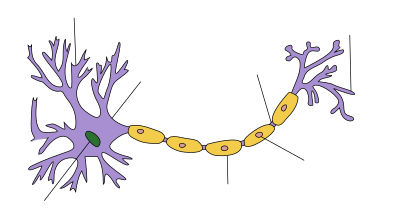Miller Fisher syndrome
| Guillain–Barré syndrome | |
|---|---|
| Synonyms | Guillain–Barré–Strohl syndrome, Landry's paralysis, postinfectious polyneuritis |
 |
|
| A handheld spirometry device, which can be used to anticipate breathing complications of Guillain–Barré syndrome | |
| Pronunciation | French pronunciation: [ɡiˈlɛ̃ baˈʁe], English pronunciation: /ɡiːˈjænbɑːrˈeɪ/ |
| Classification and external resources | |
| Specialty | Neurology |
| ICD-10 | G61.0 |
| ICD-9-CM | 357.0 |
| OMIM | 139393 |
| DiseasesDB | 5465 |
| MedlinePlus | 000684 |
| eMedicine | emerg/222 neuro/7 pmr/48 neuro/598 |
| Patient UK | Guillain–Barré syndrome |
| MeSH | D020275 |
| Neuron |
|---|
Guillain–Barré syndrome (GBS) is a rapid-onset muscle weakness caused by the immune system damaging the peripheral nervous system. The initial symptoms are typically changes in sensation or pain along with muscle weakness, beginning in the feet and hands. This often spreads to the arms and upper body with both sides being involved. The symptoms develop over hours to a few weeks. During the acute phase, the disorder can be life-threatening with about 15% developing weakness of the breathing muscles requiring mechanical ventilation. Some are affected by changes in the function of the autonomic nervous system, which can lead to dangerous abnormalities in heart rate and blood pressure.
The cause is unknown. The underlying mechanism involves an autoimmune disorder in which the body's immune system mistakenly attacks the peripheral nerves and damages their myelin insulation. Sometimes this immune dysfunction is triggered by an infection or, less commonly, surgery or vaccination. The diagnosis is usually made based on the signs and symptoms, through the exclusion of alternative causes, and supported by tests such as nerve conduction studies and examination of the cerebrospinal fluid. There are a number of subtypes based on the areas of weakness, results of nerve conduction studies, and the presence of certain antibodies. It is classified as an acute polyneuropathy.
In those with severe weakness, prompt treatment with intravenous immunoglobulins or plasmapheresis, together with supportive care, will lead to good recovery in the majority. Recovery may take weeks to years. About a third have some permanent weakness. Globally death occurs in about 7.5% of those affected. Guillain–Barré syndrome is rare, at one or two cases per 100,000 people every year. Both sexes and all parts of the world have similar rates of disease. The syndrome is named after the French neurologists Georges Guillain and Jean Alexandre Barré, who described it with André Strohl in 1916.
...
Wikipedia

